AMILY,
OF PSYCHOLOGY,
and PhD Degrees in Industrial-Organizational Psychology






Ask yourself:
What difference does leadership make?
Can we find and develop leaders who lead strong and stay connected?
How do we build organizations that challenge and support people?
Does our faith matter at work? How does it affect our identity?
Imagine a graduate program where world-class professors and recognized leaders in the marketplace equip and empower you with excellent research and training. That’s what you’ll find in SPU’s Industrial-Organizational Psychology program. These professor-mentors will enable you to change the world of work as:
• Scholars who possess the necessary tools, theoretical knowledge, and analytical skills to launch productive academic and/or consulting careers.
• Practitioners who apply knowledge and skills to manage change, utilize scientific methodologies, and improve organizations.
• Leaders who guide organizations, motivate and build teams, and develop new paradigms of leadership for the future.
This can all happen for you when you earn your MA or PhD in Industrial-Organizational Psychology at Seattle Pacific University.
What I appreciated most about the program was learning how to conduct research not just for the sake of being the best scientist I can be, but for finding truth and meaning in the work we do.”
Emily Pelosi, PhD ’15 Research Scientist Amazon (Pictured on cover)
“The I-O Psychology program developed the skills I rely on almost every day in my job as a researcher.
The mixture of research skills, hands-on experience, learning the human aspect of business, and exposure to professionals created a well-rounded combination of learning that I don’t think I would have found elsewhere.”
Experience the rigor and reward of a program built around four core essentials that can change the trajectory of your life and career for good.

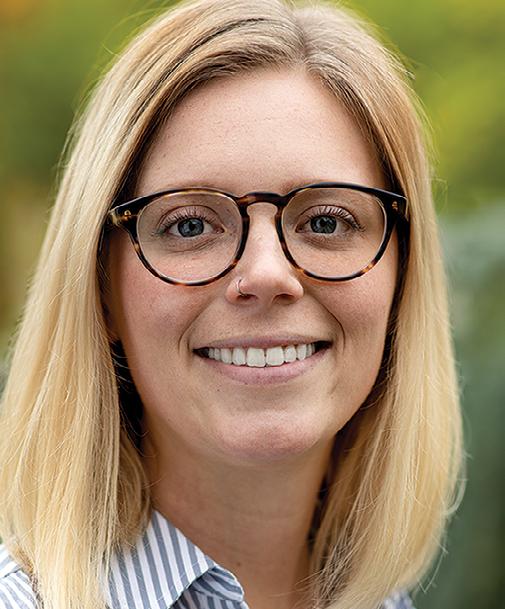
We use what’s called “evidence-based decision-making” when working with organizations. Research in IndustrialOrganizational Psychology provides the support for decisions that will positively impact both employee motivation and organizational success.
The integration of what you know and who you are
We are responsible for training students who will know how to get the job done in the real world. The elements of research and character funnel into the practical application of Industrial-Organizational Psychology. You will often hear about our “scientist-practitioner” model, which focuses on empowering students with a marriage of evidence-based theory and applicable strategies of change.
We believe that the character of a person is defined by grace, and that grace is powerful because it both highlights our need for it, and the necessity for us to offer it to others.
This program is a community of people who see their shortcomings and lead forward with strength and conviction.
“The I-O program equipped me with the knowledge and tools to confidently enter the world of learning and development, and also the mindset to continue to grow and challenge myself there.”
Annie Barthel, MA ’18 Talent Management Specialist Slalom Consulting
“The I-O program taught me hard and soft skills that I’ve leveraged in my new career.
Andres Umana, MA ’20 Analyst, People Analytics E15 Group
You The instrument of change Learn through the lenses of research, character, and practice to discover the unknown variable that is you. Use research and the practical experience and wisdom of faculty, fellow students, program alumni, and members of our local corporate and not-for-profit organizations to challenge yourself to become an instrument of change whether you serve as a consultant, employee, or leader.


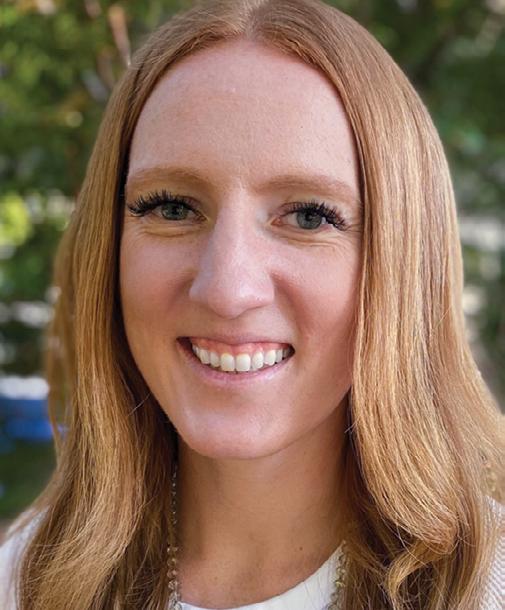
“Pursuing a degree in I-O Psychology at SPU is more than a degree. It is the partnership of rigorous academics, realtime practical application, and human-centered design that will evolve learners into practitioners, from students of the classroom to students of the world.”
Jacob Redding, PhD ’18 Learning and Development Partner – Tech Facebook
“The program’s investment in my competence and character set the foundation for my career. The rigorous learning, enriching relationships, and space for personal development make this I-O program like no other. The curation of research and practice sets students up to contribute from day one in their careers.”
Stephanie Lopez, PhD ’18 Manager, People Data Science & Analytics Nordstrom
“We are deeply invested in developing the character and competence of a generation of leaders who will transform the world of work for the better. Decades of research on the psychology of organizations are the foundation, while the discernment, self-awareness, and skill of our graduates are the catalysts for change.”
Paul Yost, PhD
Chair and Associate Professor of Industrial-Organizational Psychology; Director of Applied Learning and Development
Joey Collins, PsyD
Assistant Professor of Industrial-Organizational Psychology, at SPU since 2005
PsyD, Rosemead School of Psychology, Biola University, 2001
Helen Chung, PhD Assistant Professor of Industrial-Organizational Psychology, at SPU since 2016
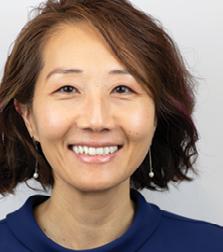
PhD, Seattle Pacific University, 2018
Jorge Lumbreras, PhD

Assistant Professor of Industrial-Organizational Psychology, at SPU since 2021
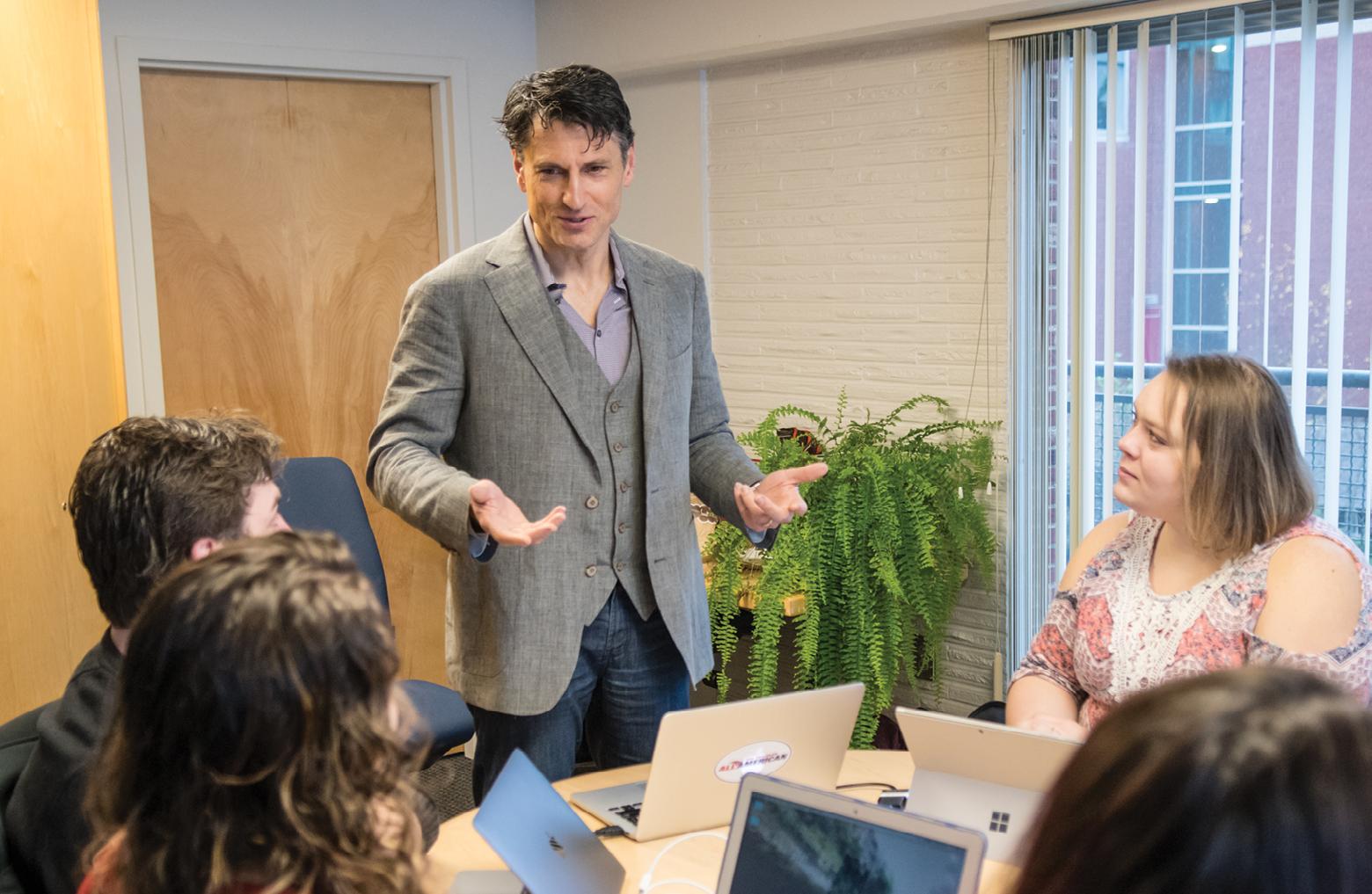
PhD, University of Georgia, 2021
Paul Yost, PhD

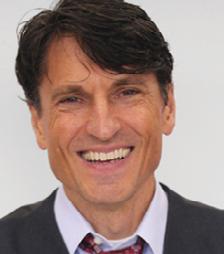
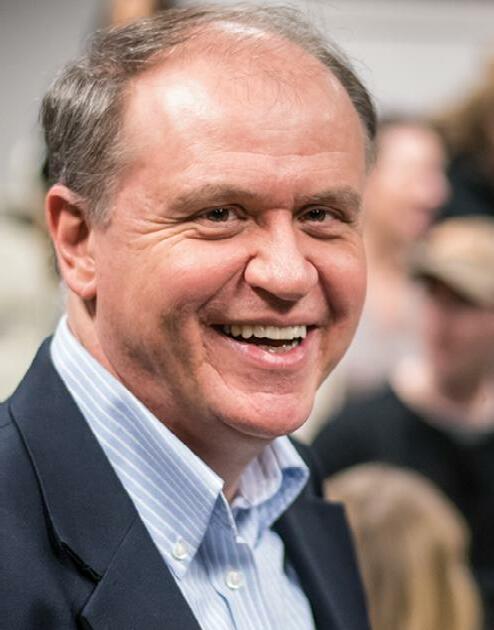
Chair and Associate Professor of IndustrialOrganizational Psychology, at SPU since 1999
PhD, University of Maryland, 1996
For faculty profiles and research interests, visit spu.edu/iofaculty.
Staff Will Stover, Program Manager
Your courses follow a carefully thought-out sequence (two years for MA; four years for PhD) that integrates your personal growth and clinical competence. The chart below shows a typical student’s course sequence for each program.
Quarter Credits Required for Completion: 66
ORG 6100 Organizational Behavior (4)
ORG 6600 Quantitative Methods in Research I: Introduction to Inferential Statistics and Analysis of Variance (4)
ORG 6003 Hacking the World of Work (4)
Winter
ORG 6610 Quantitative Methods in Research II: Correlation and Regression (4)
ORG 6300 Leadership and Team Development (4) Elective(s) or Topical Seminar (3–5)*
ORG 6101 Org Development and Consultation (4) ORG 6105 Motivation (4) Elective(s) or Topical Seminar (3–5)
Summer
ORG 6240 Social Psychology (4) ORG 6000 History and Systems (4) Elective(s) or Topical Seminar (3–5)
ORG 6003 Hacking the World of Work (4) Elective(s) or Topical Seminar (3–5) Elective(s) or Topical Seminar (3–5)
Winter
ORG 6210 Program and Org Evaluation (4) ORG 6010 Selection and Performance Management (4) Elective(s) or Topical Seminar (3–5)
Spring
ORG 6230 Learning Systems and On-The-Job Dev (4)
ORG 6001 Master’s Seminar: Faith, Meaning, and Professional Foundations (4) Elective(s) or Topical Seminar (3–5)
*Suggested elective(s) placement 10 required; 4 must be ORG topical seminars
Quarter Credits Required for Completion: 168
ORG 7031 Quantitative Methods in Research I: Introduction to Inferential Statistics and Analysis of Variance (5)
ORG 7100 Organizational Behavior (4)
ORG 7003 Hacking the World of Work (4)
ORG 7001 FMP: Vocation, Ethics, Integrity (4) ORG 7300 Leadership and Team Development (4) ORG 7032 Quantitative Methods in Research II: Correlation and Regression (5)
ORG 7101 Org Development and Consultation (4)
ORG 7105 Motivation (4)
ORG 7011 Quantitative Methods in Research III: Psychometrics/Theory of Test Construction (5)
Summer
ORG 7240 Social Psychology (4) ORG 7000 History and Systems (4) Elective(s) or Topical Seminar (3–5)
ORG 7995 Research and Dissertation (RVT) (2) ORG 7003 Hacking the World of Work (4)
ORG 7033 Quantitative Methods in Research IV: Multivariate Modeling (5) Elective(s) or Topical Seminar (3–6)
ORG 7995 Research and Dissertation (RVT) (2) ORG 7210 Program & Org Evaluation (4) Elective(s) or Topical Seminar (3–6)
ORG 7202 Personality Theory & Research (5) ORG 7995 Research and Dissertation (RVT) (2) ORG 7010 Selection and Performance Management (4)
Earned Master’s Degree
ORG 7034 Qualitative Research Methods (4) ORG 7995 Research and Dissertation (RVT) (2) Elective(s) or Topical Seminar (3–6)
ORG 7995 Research and Dissertation (RVT) (2) ORG 7021 Research Design and Methodology (5) Elective(s) or Topical Seminar (3–6)
Winter
ORG 7995 Research and Dissertation (RVT) (2) Elective(s) or Topical Seminar (3–6) Elective(s) or Topical Seminar (3–6)
ORG 7995 Research and Dissertation (4) ORG 7200 Theoretical Perspectives on Organizations (4)
ORG 7230 Learning Systems and On-the-job Development (4)
Passed Comprehensive Exam
Summer
ORG 7995 Research and Dissertation (4) ORG 7940 Placement (4) Elective(s) or Topical Seminar (3–6)
ORG 7995 Research and Dissertation (4) ORG 7940 Placement (4) Elective(s) or Topical Seminar (3–6)
Winter
ORG 7995 Research and Dissertation (4) ORG 7940 Placement (4) Elective(s) or Topical Seminar (3–6)
ORG 7995 Research and Dissertation (4) ORG 7940 Placement (4)
For more information, visit spu.edu / iopsych.
